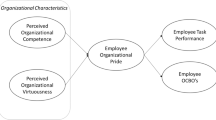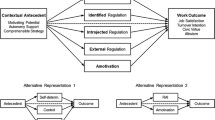Abstract
Theoretical arguments suggest that organizational virtuousness makes individuals surpass their exchange concerns sparking their prosocial motives. This paper focuses on the examination of this issue incorporating two field studies. The first field study examines prosocial motives and social exchange as parallel mediators of the relationship between organizational virtuousness’ perceptions and three employee outcomes (willingness to support the organization, time commitment, work intensity). The second field study examines prosocial motives, personal sacrifice and impression management motives as parallel mediators of the examined relationships. Both field studies (employing 250 and 354 employees, respectively) indicated that only prosocial motives can mediate the relationship between organizational virtuousness’ perceptions and employee outcomes.


Similar content being viewed by others
References
Agarwal, U. A., & Bhargava, S. (2014). The role of social exchange on work outcomes: a study of Indian managers. The International Journal of Human Resource Management, 25(10), 1484–1504.
Ahmed, I., Rehman, W., Ali, F., Ali, G., & Anwar, F. (2018). Predicting employee performance through organizational virtuousness: Mediation by affective well-being and work engagement. Journal of Management Development, 37(6), 493–502.
Allen, D. G., & Shanock, L. R. (2013). Perceived organizational support and embeddedness as key mechanisms connecting socialization tactics to commitment and turnover among new employees. Journal of Organizational Behavior, 34, 350–369.
Aristotle. (1985). Nicomachean ethics (T. Irwin, Trans.). Indianapolis: Hackett Publishing.
Arjoon, S., Turriago-Hoyos, A., & Thoene, U. (2018). Virtuousness and the common good as a conceptual framework for harmonizing the goals of the individual, organizations, and the economy. Journal of Business Ethics, 147(1), 143–163.
Avanzi, L., Fraccaroli, F., Sarchielli, G., Ullrich, J., & van Dick, R. (2014). Staying or leaving: A combined social identity and social exchange approach to predicting employee turnover intentions. International Journal of Productivity and Performance Management, 63(3), 272–289.
Baran, B. E., Shanock, L. R., & Miller, L. R. (2012). Advancing organizational support theory into the twenty-first century world of work. Journal of Business Psychology, 27, 123–147.
Bolino, M. C., Kacmar, K. M., Turnley, W. H., & Gilstrap, J. B. (2008). A multi-level review of impression management motives and behaviors. Journal of Management, 34(6), 1080–1109.
Bolino, M. C., Varela, J. A., Bande, B., & Turnley, W. H. (2006). The impact of impression-management tactics on supervisor ratings of organizational citizenship behavior. Journal of Organizational Behavior, 27, 281–297.
Bright, D. S., Cameron, K. S., & Caza, A. (2006). The amplifying and buffering effects of virtuousness in downsized organizations. Journal of Business Ethics, 64, 249–269.
Bright, D. S., Stansbury, J., Alzola, M., & Stavros, J. M. (2011). Virtue ethics in positive organizational scholarship: An integrative perspective. Canadian Journal of Administrative Sciences, 28(3), 231–243.
Bright, D. S., Winn, B. A., & Kanov, J. (2014). Reconsidering virtue: Differences of perspective in virtue ethics and the positive social sciences. Journal of Business Ethics, 119, 445–460.
Brown, S. P., & Leigh, T. W. (1996). A new look at psychological climate and its relationship to job involvement, effort, and performance. Journal of Applied Psychology, 81(4), 358–368.
Byrne, Z., Pitts, V., Chiaburu, D., & Steiner, Z. (2011). Managerial trustworthiness and social exchange with the organization. Journal of Managerial Psychology, 26(2), 108–122.
Cameron, K. S. (2003). Organizational virtuousness and performance. In K. S. Cameron, J. E. Dutton & R. E. Quinn (Eds.), Positive organizational scholarship (pp. 48–65). San Fransisco: Berrett-Koehler.
Cameron, K. S., Bright, D. S., & Caza, A. (2004). Exploring the relationships between organizational virtuousness and performance. American Behavioral Scientist, 47(6), 766–790.
Cameron, K. S., & Caza, A. (2013). Virtuousness as a source of happiness in organizations. In S. A. David, I. Boniwell & A. C. Ayers (Eds.), The Oxford handbook of happiness (pp. 676–692). Oxford: Oxford University Press.
Cameron, K. S., & Winn, B. (2012). Virtuosuness in organizations. In K. S. Cameorn & G. M. Spreitzer (Eds.), The oxford handook of positive organizational scholarship (pp. 231–243). New York: Oxford University Press.
Caza, A., Barker, B. A., & Cameron, K. S. (2004). Ethics and ethos: The buffering and amplifying effects of ethical behavior and virtuousness. Journal of Business Ethics, 52, 169–178.
Choi, Y., & Mai-Dalton, R. R. (1999). The model of followers’ responses to self-sacrificial leadership: An empirical test. The Leadership Quarterly, 10, 397–421.
Cropanzano, R., & Mitchell, M. S. (2005). Social exchange theory: An interdisciplinary review. Journal of Management, 31, 874–900.
Dawley, D., Houghton, J. D., & Bucklew, N. S. (2010). Perceived organizational support and turnover intention: The mediating effects of personal sacrifice and job fit. The Journal of Social Psychology, 150(3), 238–257.
Eisenberger, R., Armeli, S., Rexwinkel, B., Lynch, P. D., & Rhoades, L. (2001). Reciprocation of perceived organizational support. Journal of Applied Psychology, 86(1), 42–51.
Eisenberger, R., Shoss, M. K., Karagonlar, G., Gonzalez-Morales, M. G., Wickham, R. E., & Buffardi, L. C. (2014). The supervisor POS–LMX–subordinate POS chain: Moderation by reciprocation wariness and supervisor’s organizational embodiment. Journal of Organizational Behavior, 35, 635–656.
Gotsis, G., & Grimani, K. (2015). Virtue theory and organizational behavior: an integrative framework. Journal of Management Development, 34(10), 1288–1309.
Grant, A. M. (2007). Relational job design and the motivation to make a prosocial difference. Academy of Management Review, 32(2), 393–417.
Hayes, A. F. (2013). Introduction to mediation, moderation, and conditional process analysis: A regression-based approach. New York: Guilford Press.
Hur, W., Shin, Y., Rhee, S., & Kim, H. (2017). Organizational virtuousness perceptions and task crafting: The mediating roles of organizational identification and work engagement. Career Development International, 22(4), 436–459.
Lemmon, G., & Wayne, S. J. (2015). Underlying motives of organizational citizenship behavior: Comparing egoistic and altruistic motivations. Journal of Leadership & Organizational Studies, 22(2), 129–148.
MacIntyre, A. (1985). After virtue (2nd edn.). London: Duckworth.
Meyer, J. P., & Allen, N. J. (1997). Commitment in the workplace: Theory, research, and application. London: Sage.
Meyer, M. (2018, in print). The evolution and challenges of the concept of organizational virtuousness in positive organizational scholarship. Journal of Business Ethics.
Mignonac, K., & Richebé, N. (2013). No strings attached?: How attribution of disinterested support affects employee retention. Human Resource Management Journal, 23(1), 72–90.
Mitchell, T. R., Holtom, B. C., Lee, T. W., Sablynski, C. J., & Erez, M. (2001). Why people stay: Using job embeddedness to predict voluntary turnover. Academy of Management Journal, 44(6), 1102–1121.
Moore, G., & Beadle, R. (2006). In search of organizational virtue in business: Agents, goods, practices, institutions and environments. Organizational Studies, 33(3), 369–389.
Moore, G., Beadle, R., & Rowlands, A. (2014). Catholic social teaching and the firm. Crowding in virtue: A macintyrean approach to business ethics. American Catholic Philosophical Quarterly, 88(4), 779–805.
Muse, L. A., & Wadsworth, L. L. (2012). An examination of traditional versus non traditional benefits. Journal of Managerial Psychology, 27(2), 112–131.
Ngo, H., Loi, R., Foley, S., Zheng, X., & Zhang, L. (2013). Perceptions of organizational context and job attitudes: The mediating effect of organizational identification. Asia Pacific Journal of Management, 30, 149–168.
Nikandrou, I., & Tsachouridi, I. (2015). Towards a better understanding of the “buffering effects” of organizational virtuousness’ perceptions on employee outcomes. Management Decision, 53(8), 1823–1842.
Piccolo, R. F., Greenbaum, R., Hartog, D. N.D., & Folger, R. (2010). The relationship between ethical leadership and core job characteristics. Journal of Organizational Behavior, 31, 259–278.
Pierro, A., Kruglanski, A. W., & Higgins, E. T. (2006). Progress takes work: Effects of the locomotion dimension on job involvement, effort investment, and job performance in organizations. Journal of Applied Social Psychology, 36, 1723–1743.
Podsakoff, P. M., MacKenzie, S. B., Lee, J. Y., & Podsakoff, N. P. (2003). Common method biases in behavioral research: A critical review of the literature and recommended remedies. Journal of Applied Psychology, 88(5), 879–903.
Rego, A., Reis Junior, D., & Cunha, M. P. (2015). Authentic leaders promoting store performance: The mediating roles of virtuousness and potency. Journal of Business Ethics, 128, 617–634.
Rego, A., Ribeiro, N., & Cunha, M. P. (2010). Perceptions of organizational virtuousness and happiness as predictors of organizational citizenship behaviors. Journal of Business Ethics, 93, 215–235.
Rego, A., Ribeiro, N., Cunha, M. P., & Jesuino, J. C. (2011). How happiness mediates the organizational virtuousness and affective commitment relationship. Journal of Business Research, 64(5), 524–532.
Riggle, R. J., Edmondson, D. R., & Hansen, J. D. (2009). A meta-analysis of the relationship between perceived organizational support and job outcomes: 20 years of research. Journal of Business Research, 62(10), 1027–1030.
Rioux, S. M., & Penner, L. A. (2001). The causes of organizational citizenship behavior: A motivational analysis. Journal of Applied Psychology, 86(6), 1306–1314.
Shen, Y., Jackson, T., Ding, C., Yuan, D., Zhao, L., Dou, Y., & Zhang, Q. (2014). Linking perceived organizational support with employee work outcomes in a Chinese context: Organizational identification as a mediator. European Management Journal, 32, 406–412.
Shore, L. M., Tetrick, L. E., Lynch, P., & Barksdale, K. (2006). Social and economic exchange: Construct development and validation. Journal of Applied Social Psychology, 36(4), 837–867.
Shore, L. M., & Wayne, S. J. (1993). Commitment and employee behavior: Comparison of affective commitment and continuance commitment with perceived organizational support. Journal of Applied Psychology, 78(5), 774–780.
Singh, S., David, R., & Mikkilineni, S. (2018). Organizational virtuousness and work engagement: Mediating role of happiness in India. Advances in Developing Human Resources, 20(1), 88–102.
Sison, A. J. G., & Ferrero, I. (2015). How different is neo-Aristotelian virtue from positive organizational virtuousness? Business Ethics: A European Review, 24(S2), S78–S98.
Sulea, C., Virga, D., Maricutoiu, L. P., Schaufeli, W., Dumitru, C. Z., & Sava, F. A. (2012). Work engagement as mediator between job characteristics and positive and negative extra-role behaviors. Career Development International, 17(3), 188–207.
Tsachouridi, I., & Nikandrou, I. (2016). Organizational virtuousness and spontaneity: A social identity view. Personnel Review, 45(6), 1302–1322.
Tsachouridi, I., & Nikandrou, I. (2018). Organizational virtuousness and employee outcomes: The role of psychological safety and pro-social motives. In A. Stachowicz-, Stanusch & W. Amann (Eds.), Academic social responsibility. Charlotte: Information Age Publishing.
Wayne, S. J., Shore, L. M., Bommer, W. H., & Tetrick, L. E. (2002). The role of fair treatment and rewards in perceptions of organizational support and leader–member exchange. Journal of Applied Psychology, 87(3), 590–598.
Wayne, S. J., Shore, L. M., & Liden, R. C. (1997). Perceived organizational support and leader-member exchange: A social exchange perspective. Academy of Management Journal, 40(1), 82–111.
Funding
The study has received no funding.
Author information
Authors and Affiliations
Corresponding authors
Ethics declarations
Conflict of interest
The authors declare that they have no conflict of interest.
Informed Consent
It was obtained from all individual participants included in the study.
Additional information
Publisher’s Note
Springer Nature remains neutral with regard to jurisdictional claims in published maps and institutional affiliations.
Rights and permissions
About this article
Cite this article
Tsachouridi, I., Nikandrou, I. The Role of Prosocial Motives and Social Exchange in Mediating the Relationship Between Organizational Virtuousness’ Perceptions and Employee Outcomes. J Bus Ethics 166, 535–551 (2020). https://doi.org/10.1007/s10551-018-04102-7
Received:
Accepted:
Published:
Issue Date:
DOI: https://doi.org/10.1007/s10551-018-04102-7




